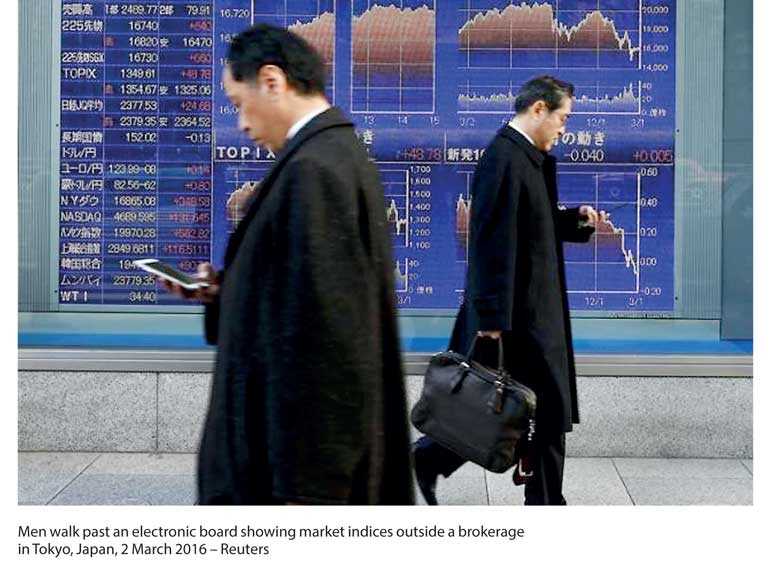Sunday Feb 22, 2026
Sunday Feb 22, 2026
Friday, 14 September 2018 00:00 - - {{hitsCtrl.values.hits}}
 TOKYO (Reuters): Asian shares advanced on Thursday on news the Trump administration has reached out to China for a new round of trade talks, which raised hopes for a deal easing the bitter tariff dispute between the world’s two biggest economies.
TOKYO (Reuters): Asian shares advanced on Thursday on news the Trump administration has reached out to China for a new round of trade talks, which raised hopes for a deal easing the bitter tariff dispute between the world’s two biggest economies.
Despite Asia’s gains, spreadbetters expected European stocks to dip, with Britain’s FTSE seen opening 0.1% lower, Germany’s DAX losing 0.24% and France’s CAC slipping 0.3%.
MSCI’s broadest index of Asia-Pacific shares outside Japan rose 0.6%, a day after it hit 14-month lows.
Early in the day, China’s A-shares shot up 1.2% on hopes for reduced trade tensions, then most of that gain was erase, but in the afternoon the index rose again, leaving it up 0.6%.
Japan’s Nikkei gained 1.0%. On Wall Street, the S&P 500 was up 0.04% on Wednesday.
Senior US officials led by Treasury Secretary Steven Mnuchin recently sent an invitation to their Chinese counterparts, including Vice Premier Liu He, to hold another bilateral trade meeting.
The development comes as more than 85 US industry groups launched a coalition on Wednesday to take public its fight against President Donald Trump’s trade tariffs.
Trump’s tariffs have escalated far beyond what business groups once imagined as the administration prepares to activate duties on $200 billion worth of Chinese goods, hitting a broad array of internet technology products and consumer goods from handbags to bicycles to furniture.
“Public support for Trump has fallen in recent weeks, with Democrats seen likely to capture the House of Representatives. He probably needs some sort of achievements on trade ahead of the mid-term elections,” said Mutsumi Kagawa, chief global strategist at Rakuten Securities in Tokyo.
“So there could be a shift in his trade policy. He will surely keep his hard line rhetoric but his administration may seek to make some deals behind the scene,” he said.
However, many market players remained cautious.
“While we agree this should provide short-term relief, the road ahead can still be tricky,” said Tai Hui, chief market strategist for JP Morgan Asset Management in Hong Kong, noting concessions China made earlier this year did not satisfy Trump.
“China may not be able to offer much more than that, especially if this involves adjusting its Made in China 2025 policy,” he said in a note.
Still, any serious signs of easing in trade tensions should benefit shares in China and other Asian courtiers the most given they have borne the brunt of U.S. protectionist moves. The trade tensions have hammered global riskier assets over the past few months as policymakers and investors worried about the hit to the world economy.
MSCI’s broad emerging markets index has fallen more than 20% from its peak in January, entering bear market territory.
“This perception that growth in the US is strong and the rest is weak should reverse. I already see some signs of that in economic surprise indicators. The gap in economic expectations between the US and Europe or Japan is too wide,” said Luca Paolini, London-based chief strategist of Pictet Asset Management, noting US stocks now account for 62% of the developed market.
That is the highest levels since the 1970s, according to Thomson Reuters Datastream.
In the currency market, the dollar eased a little on the trade talk hopes as well as on soft US wholesale price data, which undermined the case for a faster pace of policy tightening by the Federal Reserve.
US producer prices unexpectedly fell in August, recording their first drop in 1-12 years and denting talk of accelerating inflation following Friday’s strong wage data.
The euro traded at $1.1624, extending its gain this week to 0.6%. The yen weakened 0.2% on Thursday to 111.47 per dollar on easing trade worries.
The Sterling held near a six-week high of $1.3087 as Brexit-supporting lawmakers in British Prime Minister Theresa May’s party publicly pledged support for her to stay in power.
The European Central Bank and the Bank of England hold policy meetings on Thursday, but both are widely expected to leave interest rates unchanged.
Perhaps attracting more attention is a policy meeting by the Turkish central bank, which is expected to raise interest rates to shore up its battered lira.
The lira has lost more than 40% of its value against the dollar this year, hit by worries over President Tayyip Erdogan’s grip on monetary policy and by a diplomatic spat between Ankara and Washington.
The lira crisis has spread to some other emerging market countries with weak economic fundamentals such as sizable current account deficits. The lira traded at 6.3700 per dollar, up about 0.7% on the week and well off its record low of 7.240 reached one month ago.
Oil prices fell, reversing some of the strong gains from the previous session, as economic concerns raised doubts about fuel demand growth.
Brent futures hit $80 per barrel on Wednesday but eased in Asia to $79.31, down 0.5% on the day.